If you’re looking to navigate the legal side of starting a business in 2025, I recommend checking out the top startup legal guides. These books offer step-by-step instructions, practical templates, and expert advice on establishing your business structure, compliance, and legal essentials. They’re perfect for beginners and small business owners. Keep exploring to find out which of these top books can help you confidently build your legal foundation and grow your venture.
Key Takeaways
- The list highlights beginner-friendly legal guides covering business formation, compliance, and legal procedures for startups.
- It includes practical resources like templates, checklists, and downloadable forms to streamline legal setup.
- Focuses primarily on foundational legal topics relevant to early-stage entrepreneurs, with less emphasis on advanced issues.
- Guides are authored by credible experts, ensuring current, trustworthy, and applicable legal advice for startups.
- The resources cater to small business owners, aspiring entrepreneurs, and women entrepreneurs seeking accessible legal guidance.
Small Business Start-Up Kit, The: A Step-by-Step Legal Guide
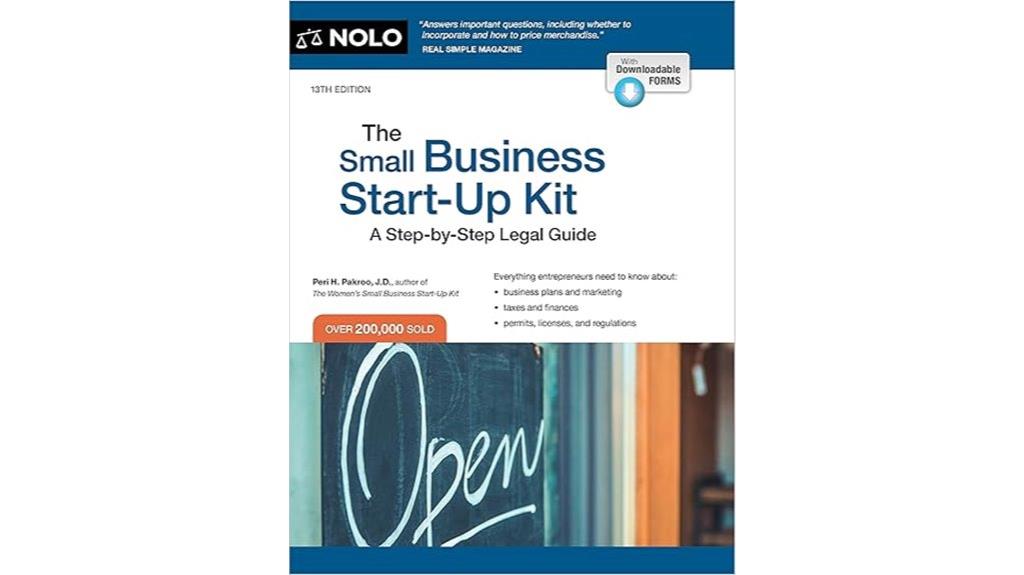
If you’re starting a small business and need clear, practical guidance, *Small Business Start-Up Kit, The: A Step-by-Step Legal Guide* is an excellent choice. I found it incredibly helpful because it provides detailed answers to common questions about launching a business. The book breaks down complex legal and procedural steps into simple, easy-to-follow instructions, perfect for beginners. It also offers useful resources and downloadable templates, making the process more manageable. While it mainly focuses on general legal considerations and standard procedures, it’s a solid foundation for understanding what’s needed to start legally and confidently.
Best For: aspiring entrepreneurs and small business owners seeking straightforward, step-by-step legal guidance to start their venture confidently.
Pros:
- Provides clear, easy-to-understand instructions suitable for beginners
- Offers practical resources and free downloadable templates to streamline setup
- Focuses on essential legal considerations and standard procedures for business formation
Cons:
- Does not extensively cover online selling or e-commerce topics
- May lack detailed guidance on advanced or niche business models
- Primarily focuses on legal and procedural issues, with limited coverage of marketing or operational strategies
Legal Guide for Starting & Running a Small Business

This legal guide is an excellent choice for aspiring entrepreneurs who need clear, practical advice on starting and managing their small businesses. Published by Nolo in 2023, it covers essential topics from legal procedures to business structures like LLCs and sole proprietorships. The book offers step-by-step lessons, templates, and resources that make complex legal concepts accessible, even without prior experience. Its durable design and all-encompassing content make it a valuable reference for solo entrepreneurs or those without mentors. Whether you’re just starting or looking to solidify your legal foundation, this guide provides the confidence and knowledge needed to navigate small business legalities effectively.
Best For: aspiring entrepreneurs and small business owners seeking clear, practical legal guidance to start and manage their ventures confidently.
Pros:
- Provides step-by-step lessons, templates, and resources for easy understanding of legal procedures and structures.
- Durable physical design with high-quality printing, making it a long-lasting reference tool.
- Suitable for beginners and experienced entrepreneurs alike, especially those without mentors or prior legal knowledge.
Cons:
- Small font size and grayish print may challenge some readers’ readability.
- Slightly thicker pages could make the book less portable for on-the-go reference.
- Focuses primarily on foundational legal topics; advanced legal issues may require additional resources.
LLC Beginners Guide: How to Start, Run, and Grow Your First Company
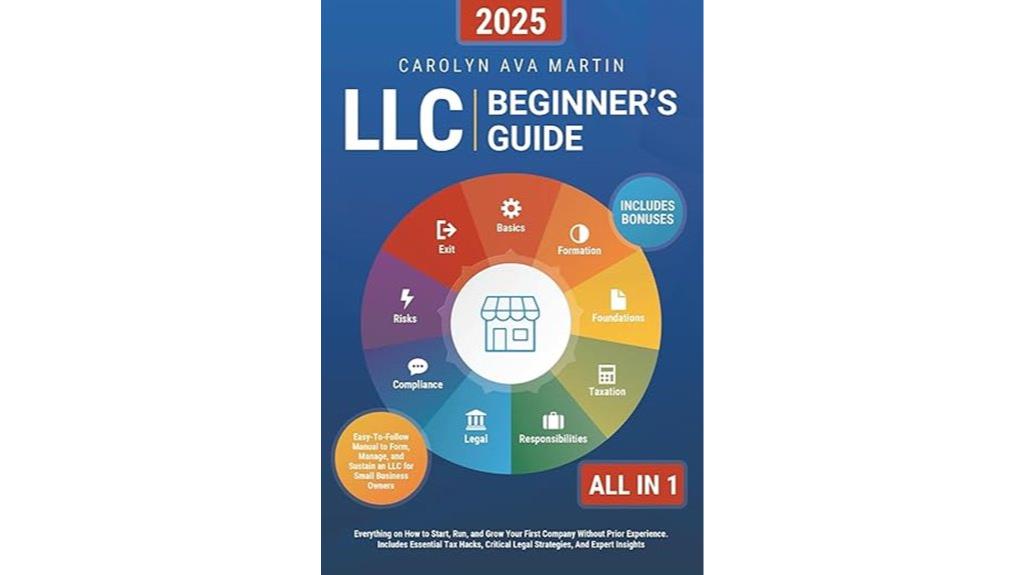
Looking to start your first LLC but feeling overwhelmed by legal and regulatory complexities? “LLC Beginner’s Guide 2025” by Carolyn Ava Martin is an ideal resource if you’re a first-time entrepreneur seeking a straightforward, step-by-step manual. This exhaustive guide simplifies topics like LLC formation, legal compliance, taxes, and business management, making them accessible for beginners. It covers choosing a name, understanding regulations, asset protection, and growth strategies, supported by real-life examples. The clear, organized structure and practical advice help you navigate startup challenges confidently, making it a valuable starting point despite minor editing flaws. It’s perfect for anyone ready to launch, run, and grow their first LLC.
Best For: First-time entrepreneurs and small business owners seeking a clear, practical guide to starting and managing their first LLC with step-by-step instructions and real-life examples.
Pros:
- Simplifies complex legal and regulatory topics for beginners
- Offers practical strategies and actionable advice for LLC formation and growth
- Includes bonus resources and visual elements to enhance understanding
Cons:
- Contains minor editing issues like typos and grammatical errors
- May require consultation with legal or tax professionals for detailed advice
- Some readers might find the guidance somewhat limited on advanced legal specifics
Startup Law and Fundraising for Entrepreneurs and Startup Advisors

Entrepreneurs and startup advisors steering legal and fundraising challenges will find the “14 Best Startup Legal Guide Books” particularly valuable, especially the standout resource on startup law and fundraising. This book offers practical guidance on legal structures, securities laws, employee agreements, and fundraising strategies, making complex topics accessible. It’s packed with real-life examples, checklists, and formulas that help identify potential issues early. Whether you’re forming your company, negotiating deals, or charting a course through compliance, this resource simplifies legal nuances, helping you mitigate risks and make informed decisions throughout your startup journey. It’s an essential tool for anyone involved in early-stage company growth and funding.
Best For: early-stage entrepreneurs, startup advisors, and legal professionals seeking a comprehensive, practical guide on startup law, fundraising, and legal risk mitigation.
Pros:
- Provides clear, accessible explanations of complex legal and regulatory issues relevant to startups.
- Includes practical checklists, formulas, and real-life examples to help identify and avoid legal pitfalls.
- Combines extensive experience and expert insights, making it a valuable reference throughout a startup’s lifecycle.
Cons:
- Limited focus on quantitative financial analysis or detailed valuation methods.
- Data Room files and templates are not downloadable, which may reduce ease of use for some users.
- Lacks a detailed table of contents or navigation aids, potentially making it harder to locate specific topics quickly.
Womens Small Business Start-Up Kit, The: A Step-by-Step Legal Guide
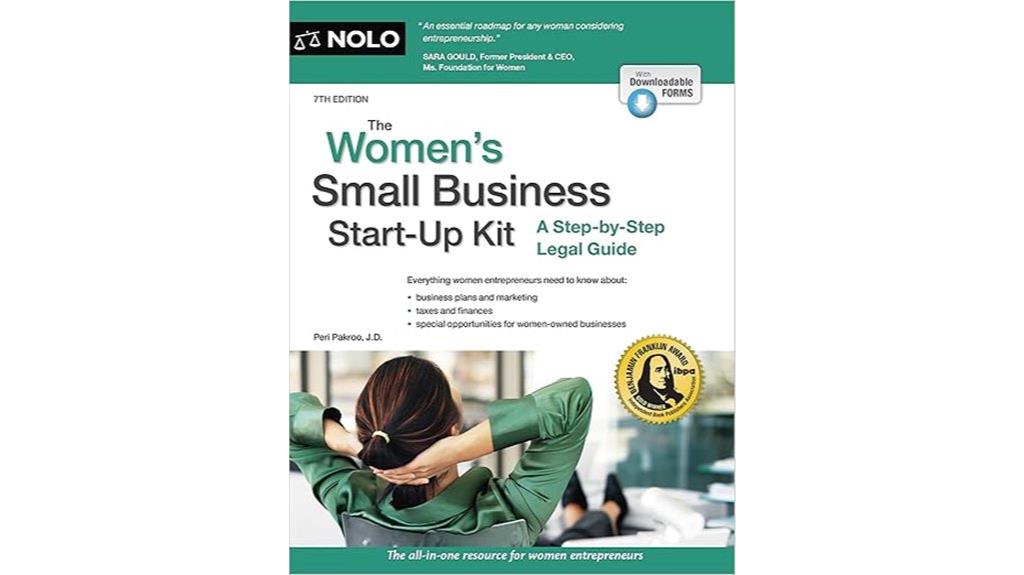
If you’re a woman starting a small business and need straightforward legal guidance, the Women’s Small Business Start-Up Kit by Mrs. Pakroo is an excellent resource. It offers clear, step-by-step instructions from developing your business idea to opening day, focusing on practical legal advice tailored for women entrepreneurs. The book covers essential topics like business planning, legal requirements, and online forms, making it accessible for beginners or those re-entering the workforce. Its organized, easy-to-understand approach simplifies complex legal concepts, helping you launch your venture confidently and correctly. I highly recommend it for women seeking reliable, actionable guidance in their startup journey.
Best For: women entrepreneurs seeking straightforward, step-by-step legal guidance to start or re-enter a small business, especially those new to entrepreneurship or balancing work with family responsibilities.
Pros:
- Clear, organized, and accessible instructions suitable for beginners.
- Covers essential topics like business planning, legal requirements, and online forms efficiently.
- Focuses on practical advice tailored to women, addressing common challenges faced by female entrepreneurs.
Cons:
- Less detailed for readers with prior small business experience, offering more overview than in-depth analysis.
- Anecdotal forums included may not provide comprehensive legal or organizational insights.
- Primarily retail-oriented, which may limit applicability for other types of businesses or sectors.
The LLC and Corporation Start-Up Guide
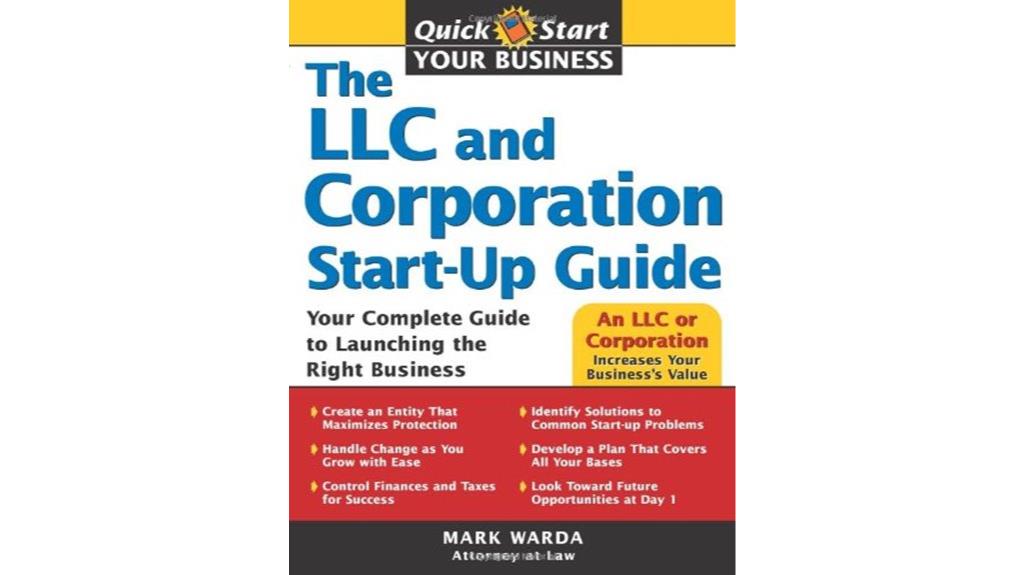
The LLC and Corporation Start-Up Guide is an ideal resource for small business owners and beginners seeking clear, practical advice on establishing their business structures. It thoroughly explains the differences between LLCs and S Corporations, helping me understand which option best suits my goals. The book walks through essential steps like filing paperwork and legal setup, making complex topics accessible. I found it incredibly helpful in removing confusion around formation processes. Its straightforward approach provided quick insights, boosting my confidence to start my business. Overall, this guide is a valuable tool for anyone wanting to make informed decisions and launch their venture with clarity.
Best For: small business owners and beginners seeking clear, practical guidance on choosing and establishing their business structure.
Pros:
- Provides thorough explanations of LLCs and S Corporations, helping readers make informed decisions
- Simplifies complex legal and formation processes, making them accessible for beginners
- Offers practical, actionable steps for filing paperwork and setting up a legal business structure
Cons:
- May not cover advanced topics or complex legal scenarios for experienced entrepreneurs
- Focuses primarily on US-based business formation, limiting applicability in other regions
- As a guide, it may require supplementary resources for detailed legal or tax advice
Womens Small Business Start-Up Kit, The: A Step-by-Step Legal Guide
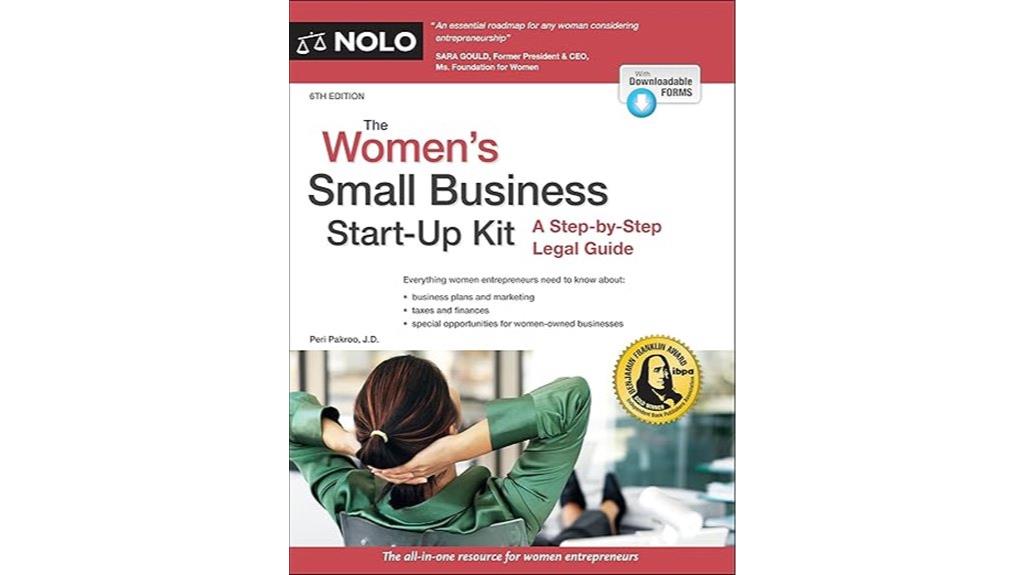
For women launching their own businesses, the “Women’s Small Business Start-Up Kit, The: A Step-by-Step Legal Guide” offers a tailored resource designed specifically to address their unique legal challenges. I found it easy to read and helpful early in my startup journey, though my copy was heavily used and somewhat worn. While only a few pages provided practical advice, I still consider it a valuable starting point, especially for beginners. Despite some criticisms about content relevance and condition, I recommend it as a useful addition to a female entrepreneur’s library, highlighting its importance in understanding startup legal basics.
Best For: female entrepreneurs seeking a legal guide to start their small business with beginner-friendly advice and resources.
Pros:
- Easy to read and understand, suitable for beginners
- Provides tailored legal guidance specific to women entrepreneurs
- Recognized as an essential resource for starting a small business
Cons:
- The physical condition of the book may be poor, heavily used or worn
- Limited practical content, with only a few pages offering actionable advice
- Some readers find the content more motivational than informational
Legal Forms for Small Business: 65 Agreements & Contracts
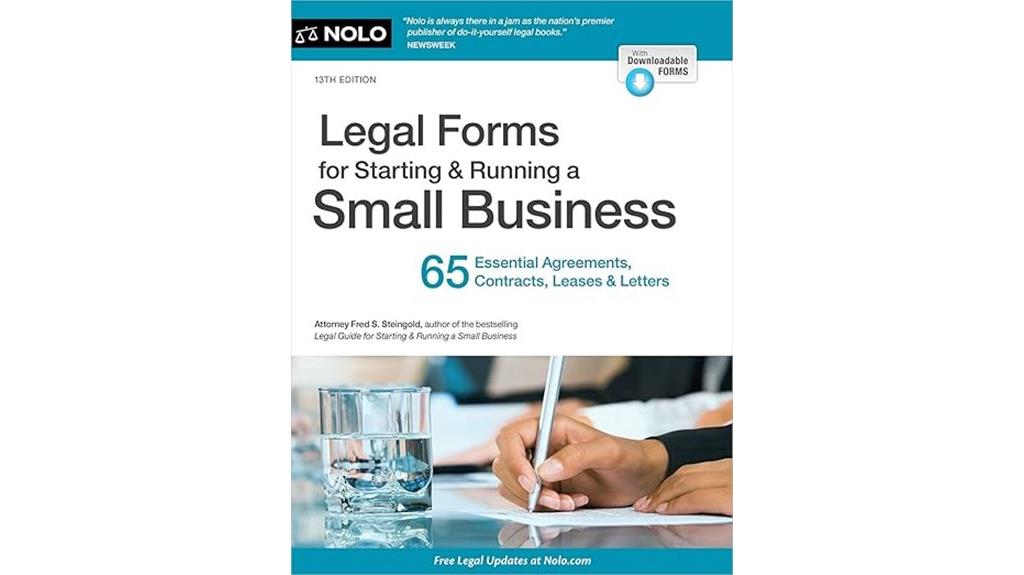
Legal Forms for Small Business: 65 Agreements & Contracts offers a practical treasure trove of ready-made templates designed specifically for entrepreneurs who need reliable, easy-to-access legal documents. As a small business owner, I know how essential it is to have solid contracts in place without always relying on costly legal help. This resource provides a wide variety of templates, from employment agreements to contracts, that I can customize to fit my needs. The convenience of accessing these forms online for free makes managing legal requirements straightforward. Owning these templates has given me peace of mind, confidence, and a strong foundation to grow my business securely.
Best For: small business owners and entrepreneurs seeking reliable, customizable legal documents to manage legal requirements confidently without high legal fees.
Pros:
- Offers a wide variety of ready-made legal templates that can be easily customized.
- Accessible for free online, saving time and money on legal assistance.
- Provides peace of mind and a strong legal foundation for business growth.
Cons:
- Some forms may be difficult to locate or interpret without legal experience.
- Templates may require careful editing to ensure they fit specific legal needs.
- Relying solely on templates without legal review could lead to overlooked legal issues.
The Startup Visa: U.S. Immigration Visa Guide for Startups and Founders
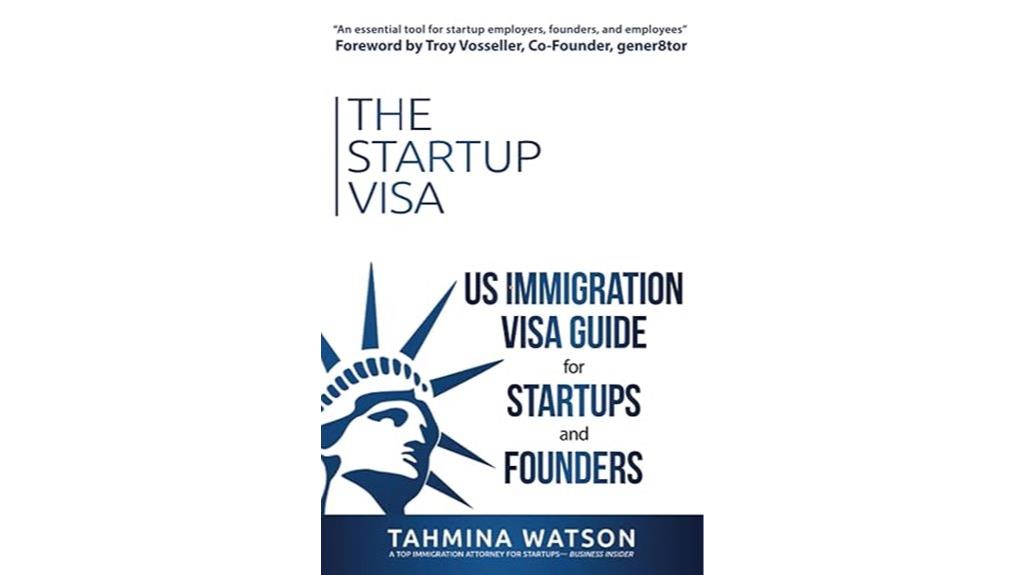
If you’re a startup founder or an aspiring immigrant entrepreneur seeking clear guidance on U.S. immigration options, “The Startup Visa: U.S. Immigration Visa Guide for Startups and Founders” by Tahmina Watson is an essential resource. It simplifies complex legal processes and explains various visa pathways like F-1, OPT, H-1B, and GEIR with practical insights. The book offers real-world case studies and strategic advice, emphasizing the importance of legal compliance and early planning. Its straightforward style makes it accessible, helping entrepreneurs navigate the immigration landscape confidently and pursue their American dream with informed, strategic steps.
Best For: startup founders, entrepreneurs, and international talent seeking clear, strategic guidance on U.S. immigration options for business ventures.
Pros:
- Simplifies complex legal processes with accessible language and practical insights
- Provides real-world case studies and strategic advice tailored for startups
- Emphasizes the importance of early planning and legal compliance for immigration success
Cons:
- May require supplementary legal advice for specific or complex cases
- Focuses primarily on U.S. immigration pathways, limiting broader international context
- As a guide, it may need updates to reflect the most current immigration policies and regulations
The Essential HR Guide for Small Businesses and Startups
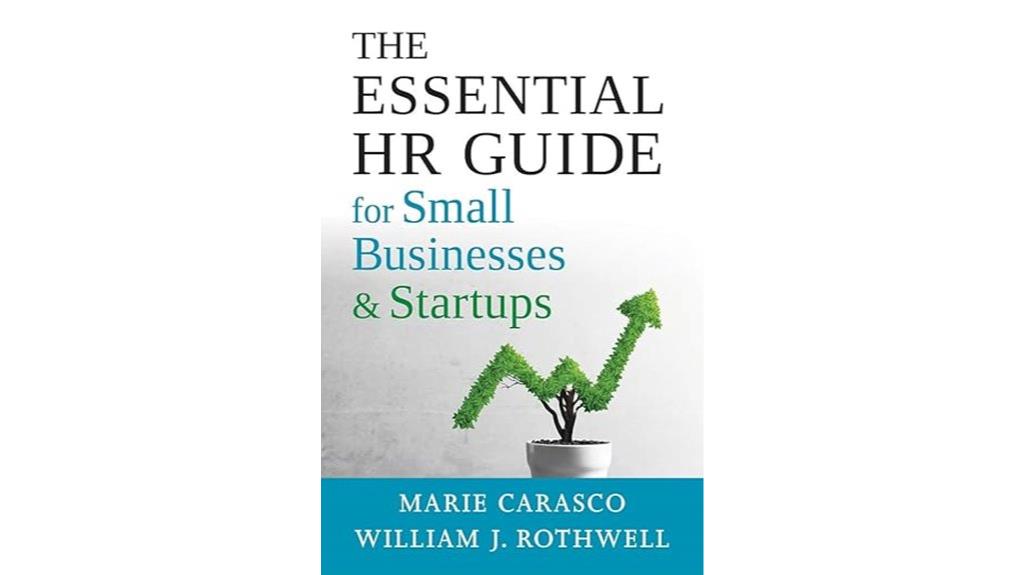
This guide is an essential resource designed specifically for small business owners and startup founders who want clear, practical HR advice. It covers key HR topics with actionable best practices, real-world examples, and useful online tools, making complex processes manageable. The book helps demystify HR, providing references and resources that boost confidence in handling employee issues and scaling operations. Both entrepreneurs and HR professionals appreciate its straightforward approach, which reduces uncertainty and supports growth. Overall, this guide equips you with the knowledge to navigate HR challenges effectively, ensuring smoother expansion and better personnel management.
Best For: small business owners and startup founders seeking clear, practical HR guidance to manage employee issues and support growth effectively.
Pros:
- Provides comprehensive, easy-to-understand HR advice tailored for small businesses and startups.
- Offers actionable best practices, real-world examples, and useful online tools to simplify HR processes.
- Serves as a reliable resource to build confidence in handling HR challenges and scaling operations.
Cons:
- May require additional resources for highly specialized HR issues beyond the scope of the guide.
- The practical advice might need to be adapted to comply with specific local or industry-specific regulations.
- Some users might find the content too general if they are seeking in-depth legal or complex HR procedural details.
Startups: Smart Legal Services Book

For startup founders and leaders seeking practical, actionable legal guidance, Kevin Davis’s “Startups: Smart Legal Services Book” stands out as an essential resource. It offers clear frameworks for when to hire full-time versus fractional legal support, helping you manage costs without sacrificing protection. Davis demystifies legal decision-making, organizational growth, and early warning signs, making legal strategy approachable and integral to scaling. Drawing from real-world experience, he shows how early legal involvement safeguards momentum and supports smarter growth. This concise, engaging guide transforms legal from a costly necessity into a strategic advantage, empowering you to lead confidently and protect your startup’s future.
Best For: startup founders, leaders, and investors seeking practical legal strategies to support growth and manage costs effectively.
Pros:
- Provides clear, actionable frameworks for legal decision-making tailored to startups.
- Emphasizes early legal involvement as a strategic advantage for growth and risk management.
- Draws on real-world experience with straightforward, jargon-free insights and examples.
Cons:
- May oversimplify complex legal issues for those needing in-depth legal analysis.
- Focused primarily on early-stage and scaling startups, less applicable to mature companies.
- Requires readers to actively interpret and implement legal strategies without personalized legal advice.
The Small Business Start-Up Kit: A Step-by-Step Legal Guide
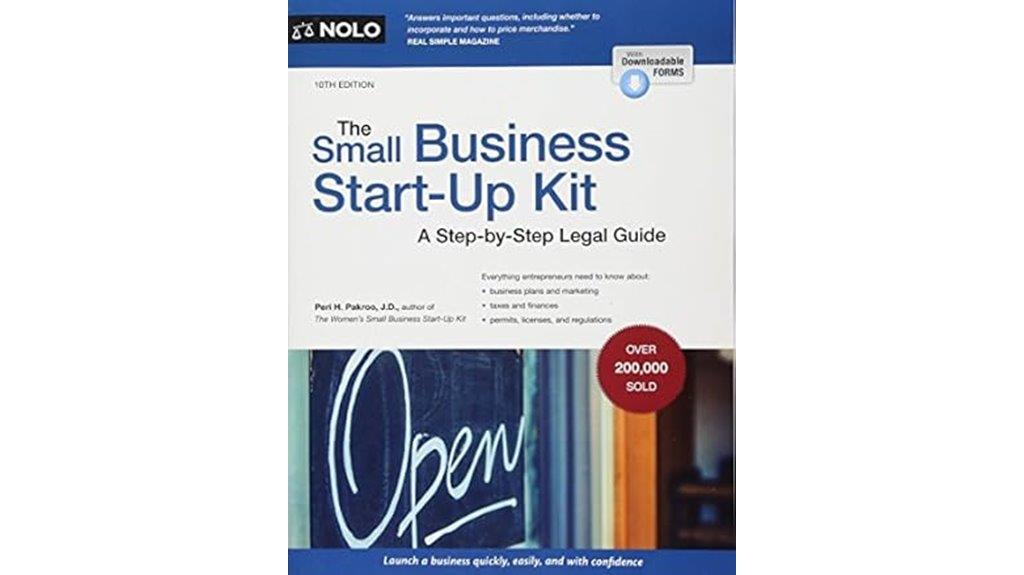
The Small Business Start-Up Kit: A Step-by-Step Legal Guide stands out as an ideal resource for newcomers who want a straightforward overview of business formation and legal essentials. It offers easy-to-understand tips and a clear, quick summary of starting a business. While not exhaustive, it provides valuable insights for beginners, making complex topics accessible. However, it falls short as a one-stop solution, often requiring additional research. Download links for forms can be unreliable, so patience is necessary. Overall, it’s a helpful starting point, but I recommend supplementing it with more in-depth resources as you progress.
Best For: Beginners seeking a straightforward, easy-to-understand overview of business formation and legal basics to get started with their small business.
Pros:
- Provides clear, simple tips suitable for newcomers to business law and organization
- Acts as a quick, informative summary that makes complex topics accessible
- Offers valuable foundational insights that can guide initial decision-making
Cons:
- Not comprehensive; additional resources and research are often necessary
- Download links for forms frequently do not work, causing frustration
- Limited scope, requiring further learning for a full understanding of legal and business setup
Legal Guide for Starting & Running a Small Business
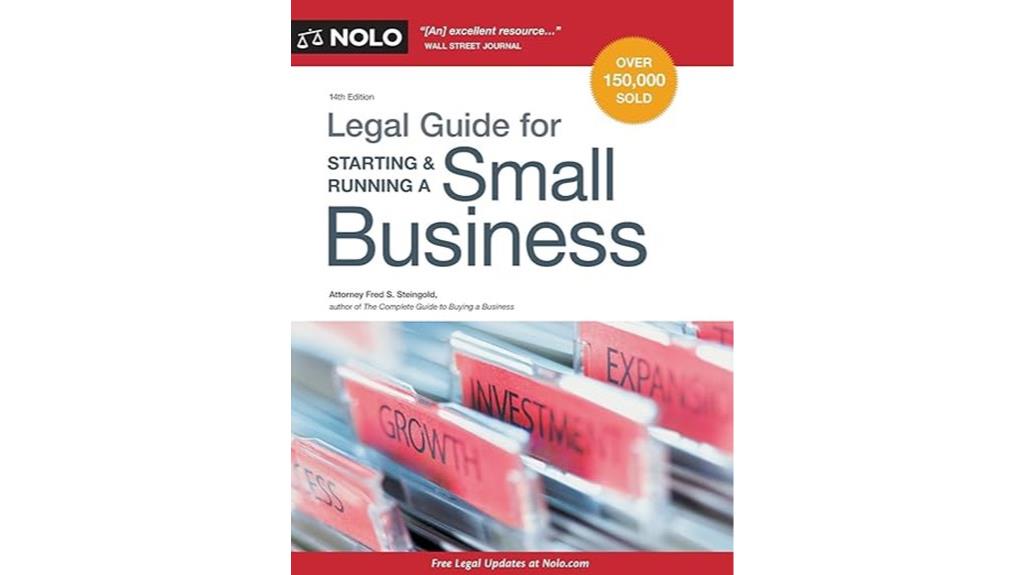
If you’re new to entrepreneurship and need practical, straightforward guidance on legal matters, the “Legal Guide for Starting & Running a Small Business” is an ideal resource. It offers clear, accessible explanations of essential legal topics, including forms, business structures, and legal requirements, with real-world examples. Many users turn to this book for help with decisions like forming an LLC or understanding legal processes. Although it doesn’t cover everything, such as trademarks, it remains a highly recommended starting point. I’ve found it invaluable for gaining confidence, communicating effectively with professionals, and managing my business’s legal side efficiently.
Best For: new entrepreneurs, small business owners, and students seeking clear, practical legal guidance on starting and managing a small business.
Pros:
- Provides accessible, easy-to-understand explanations of essential legal topics.
- Includes practical examples and real-world applications to aid understanding.
- Serves as a reliable reference for legal processes like forming an LLC and understanding legal requirements.
Cons:
- Does not cover certain topics such as trademarks.
- May lack advanced legal details for experienced business owners.
- Focuses primarily on foundational topics, which might require supplementary resources for in-depth legal issues.
How to Start, Run & Grow a Successful Restaurant Business
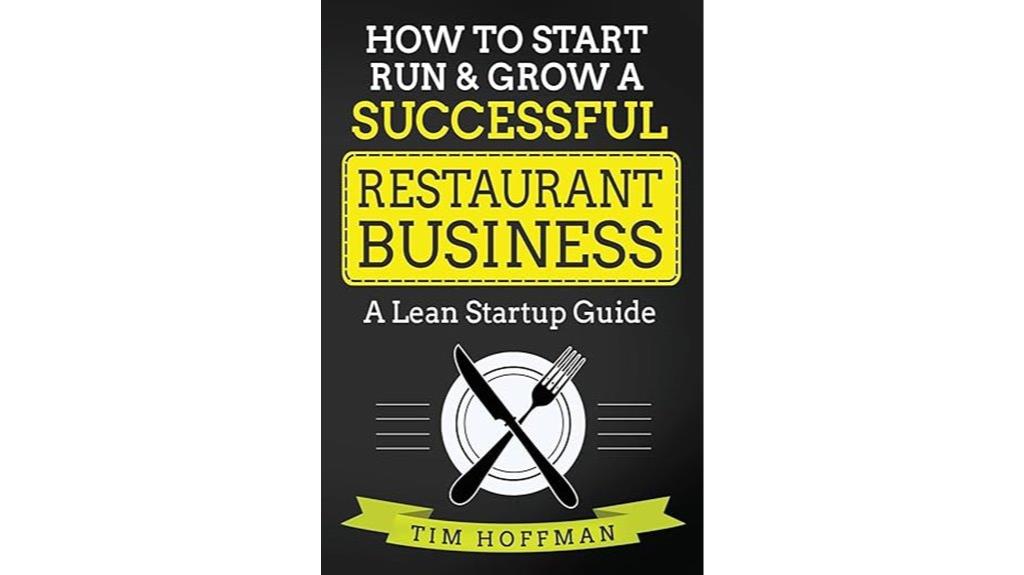
Aspiring restaurant owners seeking practical, step-by-step guidance will find “14 Best Startup Legal Guide Books” especially valuable. Starting a restaurant demands clear purpose and thorough research. I recommend developing a solid business plan to secure funding and outline cash flow, profits, and operations. Exploring different restaurant types and models helps avoid costly mistakes and sets realistic expectations. Understanding your concept—whether full-service, fast-casual, or franchise—is vital, especially when choosing cost-effective alternatives. Effective operation relies on menu design, staffing, and legal considerations. Proper financial planning, including managing costs and securing funding, is essential for sustainable growth. This guide provides the foundational knowledge needed to navigate the industry confidently.
Best For: aspiring restaurant owners and entrepreneurs seeking comprehensive, practical guidance on starting, running, and growing a successful restaurant business.
Pros:
- Provides step-by-step instructions and foundational industry knowledge, making complex topics accessible.
- Emphasizes importance of planning, research, and financial management to ensure sustainable growth.
- Offers practical tips on concept development, menu design, staffing, and legal considerations.
Cons:
- Content may feel somewhat generic or slightly outdated for advanced industry professionals.
- Lacks detailed real-life franchise startup costs and specific financial figures.
- Focuses primarily on beginners, which might not fully address the needs of experienced restaurateurs.
Factors to Consider When Choosing Startup Legal Guide Books

When selecting a startup legal guide, I focus on how well it matches my business type and covers the relevant legal issues. I also consider the author’s credibility and whether the book offers practical, easy-to-understand resources. Ultimately, clarity and scope make certain I get useful guidance without unnecessary complexity.
Relevance to Business Type
Choosing the right startup legal guide depends heavily on your specific business type. You want a book that addresses legal considerations unique to your industry, whether you’re running a retail store, restaurant, or online e-commerce platform. It’s essential to verify that the guide covers industry-specific regulations and licensing requirements relevant to your sector. Additionally, look for advice on suitable business structures, like LLCs or corporations, that fit your operational needs. Consider whether the book provides tailored guidance for your business size, whether you’re a startup or a growing enterprise. Finally, check if it includes industry-relevant legal forms, contracts, and templates that you’ll need for daily operations. A well-chosen guide ensures you’re equipped with practical, sector-specific legal knowledge.
Legal Scope Coverage
A thorough startup legal guide must cover key legal structures like LLCs, corporations, and sole proprietorships to help you determine the best fit for your business. It should also address essential areas such as legal compliance, licensing, permits, and regulatory requirements relevant to starting and running a business. A comprehensive guide must include chapters on contracts, employment law, intellectual property, and liability to guarantee you understand how to protect your interests. For startups seeking funding, coverage of fundraising laws, securities regulations, and investor agreements is vital. Additionally, practical tools like templates, checklists, and resources aligned with current laws make the guide actionable. Overall, a broad scope ensures you’re equipped with the legal knowledge necessary to navigate the complexities of launching and growing your business confidently.
Author Credibility and Expertise
The credibility and expertise of an author are crucial factors to take into account because they directly impact the accuracy and reliability of the legal guidance provided. An author’s professional background, such as a law degree or experience in business law, ensures the information is current and applicable. Recognized experts or attorneys who have written multiple books on startup law demonstrate a thorough understanding of complex topics. Authors with direct experience working with small businesses or startups tend to offer more practical advice. Additionally, an author’s reputation within legal and entrepreneurial communities signals trustworthiness and quality. When choosing a startup legal guide, I look for credentials, relevant experience, and industry recognition to ensure I’m getting reliable, expert guidance that I can count on.
Practical Resource Availability
When evaluating startup legal guidebooks, practical resource availability can make a significant difference in how useful the book truly is. Access to downloadable forms, templates, and checklists can streamline legal compliance and document preparation, making complex processes more manageable. Many guides offer online resources and supplemental materials, but their usability and accessibility vary. The presence of practical tools like sample contracts, step-by-step instructions, and legal templates enhances real-world application, saving entrepreneurs time and effort. Easy access to these resources ensures you can implement legal strategies effectively without immediately needing professional help. Conversely, limited or hard-to-find resources can hinder your progress. Before choosing a guidebook, verify the availability and quality of these supplemental materials to ensure they support your startup’s legal needs efficiently.
Clarity and Readability
Clarity and readability are essential factors to contemplate when selecting a startup legal guidebook, as they directly impact how well you can understand and apply the information. A book with clear, straightforward language makes complex legal concepts accessible, especially for beginners. Well-organized chapters and headings help you find specific topics quickly and follow a logical flow. Using simple terminology instead of jargon reduces confusion and boosts confidence in applying legal advice. Concise explanations and summaries ensure you grasp key principles fast and retain critical details. Visual aids like diagrams or bullet points break dense information into digestible parts, enhancing comprehension. Ultimately, a guidebook that prioritizes clarity and readability makes legal concepts less intimidating and more actionable for entrepreneurs.
Cost and Accessibility
Choosing a startup legal guide that fits your budget and is easy to access can save you time and money. Look for resources priced around $30-$50 to stay within your startup’s budget, especially for thorough guides. Digital formats like eBooks or online access are often more affordable and instantly available, making them a practical choice. Check if the guide offers free downloadable templates or resources, which add value without extra costs. Consider whether it’s accessible through affordable channels such as libraries, online retailers, or subscription services to reduce barriers. Additionally, ensure that supplementary materials, like online forms or updates, are easy to access and don’t come with hidden fees. Prioritizing cost-effective and accessible options helps you get the most value without stretching your resources.
Frequently Asked Questions
How Do Legal Guide Books Differ for Tech Startups Versus Brick-And-Mortar Businesses?
Legal guidebooks for tech startups focus heavily on issues like intellectual property, software licensing, data privacy, and cybersecurity, which are vital in the digital domain. In contrast, brick-and-mortar business guides emphasize real estate, zoning laws, permits, and employment regulations. I find that understanding these differences helps me choose the right resources, ensuring I cover all legal bases whether I’m launching a tech app or opening a storefront.
Are There Specific Legal Considerations for Startups in Different States or Countries?
When considering legal aspects for startups, I realize that state and country differences really matter. Each location has its own laws on business formation, taxes, and employment. I always recommend researching local regulations or consulting a legal expert to avoid surprises. It’s essential to tailor your legal approach based on where you operate, ensuring full compliance and protecting your startup as it grows.
How Frequently Should Entrepreneurs Update Their Legal Knowledge Through These Books?
Ever wonder how often I should update my legal knowledge? Honestly, I check for updates at least once a year, or whenever there’s a big change in laws or regulations affecting my startup. Staying current is vital to avoid legal pitfalls. I also keep an eye on new books and resources, because laws evolve, and I want to make certain I’m always compliant and protected. Wouldn’t you want the same?
Can These Legal Guides Help With International Expansion and Compliance?
Absolutely, these legal guides can be incredibly helpful for international expansion and compliance. I’ve found they provide valuable insights into steering through different legal systems, understanding local regulations, and avoiding costly pitfalls. While they’re a great starting point, I also recommend consulting local legal experts to guarantee you’re fully compliant. Combining these resources with expert advice gives you the confidence to expand globally without legal headaches.
Do the Books Cover Legal Issues Related to Emerging Technologies Like AI or Blockchain?
I’ve found that many legal books now cover emerging technologies like AI and blockchain, as these areas are rapidly evolving. They often include sections on intellectual property, data privacy, and regulatory compliance specific to these innovations. If you’re interested in these topics, look for guides that specifically mention emerging tech or digital assets, as they tend to stay up-to-date with the latest legal challenges and opportunities in this fast-moving space.
Conclusion
Choosing the right startup legal guide is like finding the perfect compass; it steers you through the complex terrain of entrepreneurship. These books are invaluable tools, offering clarity and confidence as you build your dream. Immerse yourself in them with an open mind, and you’ll navigate legal hurdles more smoothly—like a skilled sailor steering through choppy waters. Remember, the right knowledge can transform uncertainty into opportunity, setting you up for lasting success.











